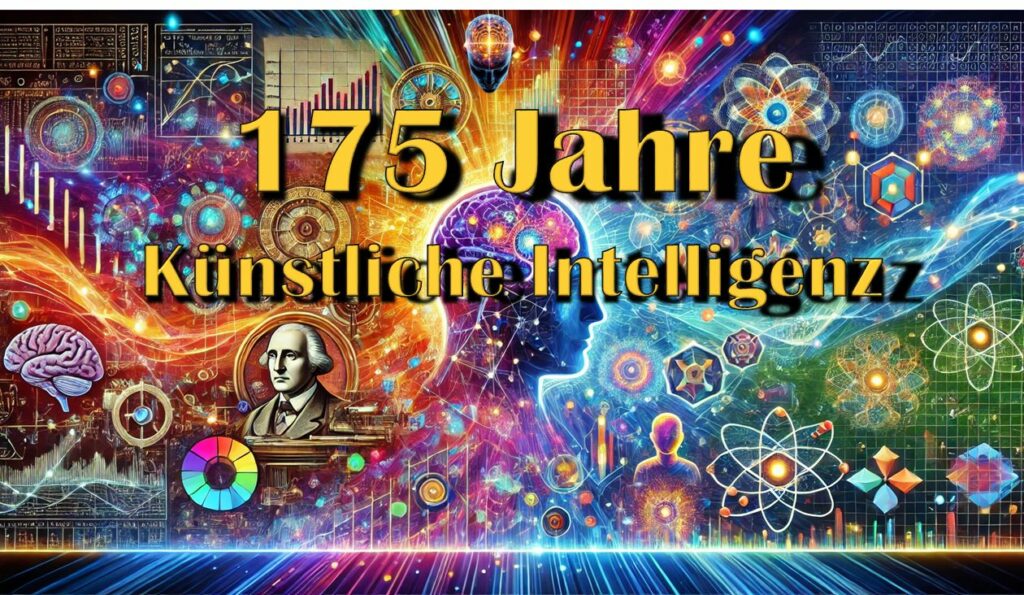
Interim CIO: Dr. Claus Michael Sattler
175 years of artificial intelligence

175 years of artificial intelligence, let’s celebrate together. A milestone in the history of technology and science that has fundamentally changed our world and will continue to do so.
The birth of artificial intelligence - 175 years of artificial intelligence
Artificial intelligence, often referred to as AI for short, is a fascinating field that describes the ability of computer systems to simulate human-like intelligence [source: 1]. Its roots go back deep into the history of mathematics and computer science, where it represents a remarkable symbiosis of statistics and stochastics.
Statistics, introduced by Gottfried Achenwall in 1749, 175 years ago, as the “science of data on the state”, and stochastics, a term coined by Jakob Bernoulli during his lifetime, published in a book in 1713, eight years after his death, and not taken up again until 1917 by L. von Bortkiewicz, form the foundation on which modern AI is built. This fusion of data analysis and probability theory has paved the way for the development of intelligent systems that are now capable of solving complex problems and making decisions.
The evolution of AI foundations for 175 years of artificial intelligence
Machine learning: the heart of AI
One of the most important foundations of AI is machine learning [source: 1]. This revolutionary technique enables computers to learn from experience and adapt without being explicitly programmed. It is as if we have given machines the ability to develop their own intuition
Machine learning comprises various approaches:
- Supervised learning: Here, models are trained with sample data, similar to how a teacher instructs a student [source: 3].
- Unsupervised learning: In this method, systems independently discover patterns in data without explicit specifications [source: 3].
- Reinforcement learning: A fascinating approach in which systems learn through trial and error, much like a child learning a new skill.
Deep learning: the next evolutionary step
One particularly impressive development in the field of machine learning is deep learning[source: 1]. This technology, which is based on artificial neural networks with many layers, has taken the capabilities of AI to a new level. Deep learning models can recognize complex patterns in huge amounts of data and are the driving force behind many modern AI applications, from speech recognition to autonomous vehicles [source: 2].
Natural language processing: the bridge between man and machine
Another fascinating foundation of AI is natural language processing (NLP) [source: 2]. This technology enables machines to understand, interpret and generate human language. NLP has paved the way for applications such as automatic translation programs and voice assistants, revolutionizing the way we interact with technology.
The practical application of AI basics after 175 years of artificial intelligence
The fundamentals of AI are not just theoretical concepts, but have practical applications in numerous areas of our daily lives [source: 3].
In industry and production
AI systems optimize production processes, improve quality control and enable predictive maintenance. They help companies to produce more efficiently and sustainably, thereby contributing to a more resource-efficient economy.
In the healthcare sector
In medicine, AI systems support the diagnosis of diseases, the development of new drugs and the personalization of treatments. They analyze medical images with a precision that often surpasses human ability, helping to save lives and improve patients’ quality of life.
In mobility
Autonomous vehicles, a prime example of the practical application of AI, promise to make our mobility safer, more efficient and more environmentally friendly. They combine various AI technologies such as computer vision, sensor fusion and decision-making algorithms to master complex traffic situations.
In communication
Voice assistants such as Siri or Alexa, which are based on natural language processing, have revolutionized the way we interact with technology. They make information more accessible and make everyday life easier for many people, especially those with limited abilities.
The ethical implications of AI
With great power comes great responsibility. The foundations of AI not only bring technological advances, but also important ethical questions. How do we ensure fairness and transparency in AI systems? How do we protect user privacy? How do we prevent the misuse of this powerful technology?
Answering these questions and establishing ethical guidelines for the development and use of AI is one of the greatest challenges of our time. It is our responsibility to ensure that AI is used for the benefit of humanity and does not become a tool of oppression or manipulation.
The future of AI after 175 years of artificial intelligence
The foundations of AI that we are celebrating today are just the beginning. The future promises even more fascinating developments:
- Quantum computing and AI: The combination of quantum computing and AI could lead to a quantum leap in the performance of AI systems.
- Explainable AI: Progress in this area will make AI systems more transparent and easier to understand, which will strengthen trust in this technology.
- AI and the Internet of Things: the fusion of these two technologies will lead to smarter, connected environments that can improve our lives in many ways.
Conclusion after 175 years of artificial intelligence
The foundations of artificial intelligence that we are honoring today are more than just technological achievements. They represent the tireless human spirit of innovation and progress. From the early days of statistics and stochastics to the complex neural networks of today, generations of scientists, engineers and visionaries have worked to develop and refine this technology.
Each of these foundations, from machine learning algorithms to the principles of natural language processing, has helped to create a technology that touches and changes almost every aspect of our lives. They have opened doors to possibilities that once existed only in science fiction novels.
But while we celebrate these remarkable achievements, we must also recognize the responsibility that comes with them. The power of AI brings with it ethical challenges that we must address as a society. We must ensure that this technology is used fairly, transparently and for the benefit of all.
So let’s celebrate these foundations of artificial intelligence not only as technological milestones, but also as signposts for a future in which technology and humanity go hand in hand. A future in which AI is not only intelligent, but also wise. A future in which we continue to push the boundaries of what is possible while preserving our humanity.
The foundations of AI are a testament to what we as humans can achieve when we put our minds and creativity to work. They are a reminder that our greatest achievements often come from collaboration and the shared pursuit of knowledge.
As we look to the future, we can only imagine what amazing developments the next foundations of AI will bring. But one thing is certain: they will build on the foundations we celebrate today and take us further into a world where the boundaries between man and machine are becoming increasingly blurred.
Let’s use these foundations of Artificial Intelligence as a springboard to a future that is brighter, smarter and more human than ever before. A future where AI is not just a tool, but a partner in our quest for knowledge, progress and a better life for all.
Sources
- https://datasolut.com/was-ist-kuenstliche-intelligenz/
- https://www.contentmanager.de/wissen/kuenstliche-intelligenz-verstehen-grundlagen-anwendungen-geschichte/
- https://kispektrum.de/ki-news/ki-einfach-erklaert-grundlagen-und-konzepte/
- https://wgp.de/de/kuenstliche-intelligenz/
- https://de.wikipedia.org/wiki/K%C3%BCnstliche_Intelligenz
- Image: ChatGPT